Israel & the Near East
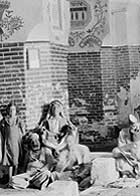 Ezekiel’s Tomb
Ezekiel’s TombTuesday, January 19, 2010 | Jewish Ideas Daily » Daily Features
Twenty-five centuries have passed since exiled Jews first wept for Zion by the waters of Babylon. Today only eight Jews are left in Iraq. Their story is not as well known as that of their European brethren, but in the Babylonian Talmud, for starters, Babylon-Iraq was home to the most influential post-biblical book in Jewish history. That it would become so was due to the Geonim, another extraordinary set of Iraqi rabbis who flourished in early Islamic times and whose most significant figure was Saadya ben Joseph (882/892–942). After the Middle Ages, creativity extended outward as well, with Iraqi Jews founding other...
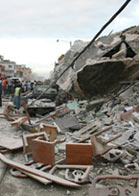 The Harshness of Creation
The Harshness of CreationLike the 2004 tsunami that devastated southeast Asia, yesterday's catastrophic earthquake in Haiti, a poverty-stricken country with a legacy of home-grown violence and suffering, inevitably provoked the terrible question: where was God? One answer derives from Jewish religious sources, and specifically from the teachings of the Kabbalah. It has to do with tzimtzum, or contraction: that is, God's own contraction and limitation of Himself in order to make space for the finite—and invariably flawed—worlds of physical nature and human action. The idea was most famously developed in Safed, Palestine by the 16th-century kabbalist Isaac Luria as part of a complicated, esoteric myth...
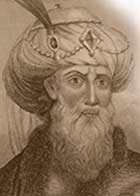 Jewish Wars, Then and Now
Jewish Wars, Then and NowMonday, January 11, 2010 | Jewish Ideas Daily » Daily Features
A masterwork of historical writing, The Jewish Wars by Yosef ben Matityahu, better known by his Roman name of Flavius Josephus (37–ca. 100 C.E.) is a massive and indispensable chronicle of Jewish fortunes from the Hasmonean Revolt in the second century B.C.E. through the destruction of the Temple and the fall of Masada in 73 C.E. It is also the autobiography of an extraordinary and extraordinarily conflicted man. Military leader, historian, biblical interpreter, negotiator, diplomat, neither martyr nor traitor but something in-between, Josephus traversed a route from battlefield commander in the war against Rome to Roman citizen and favored beneficiary of imperial...
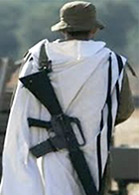 And That’s an Order?
And That’s an Order?Wednesday, January 6, 2010 | Jewish Ideas Daily » Daily Features
International pressure is mounting on the Netanyahu government to freeze—and eventually remove—Jewish settlements in Judea and Samaria. Simultaneously, a heated domestic debate is taking place within the national-religious (Dati Leumi) community over whether religious soldiers can, if push comes to shove, resist a government order to remove settlers from their homes. The argument resonates most strongly in the "Hesder" yeshivot, higher-level schools whose students alternate periods of Talmud study with active military duty. Yesterday, the heads of Har Etzion, a flagship Hesder yeshiva, issued a strong statement against disobedience. The issue is made more acute by the fact that so many religious...
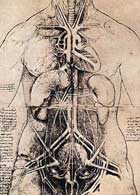 Some Things Never Go Away
Some Things Never Go AwayMonday, January 4, 2010 | Jewish Ideas Daily » Daily Features
Nine years ago, according to recent reports in the Israeli media, the head of the country's leading forensic institute admitted to having transplanted tissues and organs—corneas, skin, heart valves, and bones—from deceased Jews, Palestinians, and foreign workers. It seems that the families of the decedents, while consenting to autopsies, had not consented to transplants. The practice was halted and the physician dismissed from his post. Old news, then. But the exact nature of the doctor's past actions, limited if clearly unethical, was lost in the furor aroused by the surfacing of this old news in late December. In Britain, the Guardian...
Editors' Picks
The "Mañana" Approach Ari Shavit, Haaretz. The recent UN report confirming Iran's nuclear capabilities has a disturbing subtext: for a decade, Israeli intelligence postponed taking necessary action.
Release Marwan Barghouti Avinoam Bar-Yosef, New York Times. Israel isn't the only government afraid of releasing Palestinian terrorists. There's one whom Mahmoud Abbas would be happy to keep behind bars.
Persian Incursion Michael Peck, Foreign Policy. Want to know what would happen if Israel launched an air strike on Iran's nuclear facilities? There's a board game for that.
The Case for Acting Now Jonathan S. Tobin, Contentions. Time may be running out for covert efforts aimed at sabotaging Iran's nuclear program.
The Case for Cooling Their Jets Aaron David Miller, Foreign Policy. As the U.S. and Israel consider a preemptive strike against Iran, here are the top five reasons why they should keep their missiles on the ground.
Shetzef or Schwartzkopf? Adaya Fiterman, Ruti Levy, Haaretz. In just 60 years, Israeli consumers have swung from Hebrew brand names to fascination with foreign labels—and back again.
Another Effort to Destroy Israel Elliott Abrams, Weekly Standard. We've seen Durban III and Palestinian statehood at the UN, but the international legal system is not done with Israel. Have you heard about the Russell Tribunal?
The Bold and the Reckless Hillel Halkin, Wall Street Journal. Although both Ben-Gurion and Sharon were daring decision makers, the former's decisions were mostly right and the latter's were frequently wrong.
The Origins of Jewish Creativity Moment. Twenty thinkers and artists, including David Brooks, Bob Mankoff, Brian Greene, and Joshua Bell, weigh in on the intersection between Judaism and the creative impulse.
Indigenous Israel Allen Z. Hertz, American Thinker. Of all extant peoples, Jews have the strongest claim to be aboriginal to the Holy Land—but have misunderstood the concept of aboriginal rights.

